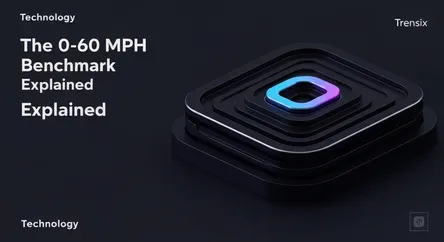Technology
The 0-60 MPH Benchmark Explained

Discover why the 0-60 mph time is the ultimate benchmark for car performance and how electric vehicles are changing the game. Learn what it means.
What is it?
The 0-60 mph (or 0-100 km/h) time is a widely used performance benchmark that measures a vehicle's acceleration from a complete stop to 60 miles per hour. It's a universally accepted metric for evaluating a car's straight-line quickness and the effectiveness of its powertrain, transmission, and grip. For decades, it has served as a primary bragging right for manufacturers and a key point of comparison for enthusiasts and consumers alike. A lower time indicates faster acceleration, which is often associated with high-performance sports cars and supercars.
Why is it trending?
The 0-60 mph benchmark is experiencing a major resurgence due to the rise of electric vehicles (EVs). The instant torque delivery of electric motors allows even mainstream family EVs to achieve acceleration times that were once the exclusive domain of expensive supercars. Manufacturers like Tesla, Lucid, and Rimac heavily market their sub-3-second and even sub-2-second 0-60 mph times, creating a new 'acceleration war'. This has renewed public interest in the metric as a tangible way to understand the dramatic performance advantages of electric powertrain technology.
How does it affect people?
For consumers, a quick 0-60 time translates to a thrilling driving experience and practical benefits like effortless merging onto highways. It has become a significant factor in purchasing decisions, especially for those seeking performance. This trend has pushed traditional automakers to enhance the acceleration of their own combustion and hybrid models to remain competitive. Ultimately, the focus on 0-60 mph showcases rapid technological advancements in the auto industry, providing drivers with access to unprecedented levels of performance across a wider range of vehicles than ever before.